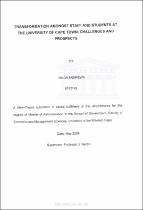| dc.contributor.advisor | Bardill, J | |
| dc.contributor.author | Andrews, Hilda | |
| dc.date.accessioned | 2022-11-15T08:29:17Z | |
| dc.date.available | 2022-11-15T08:29:17Z | |
| dc.date.issued | 2008 | |
| dc.identifier.uri | http://hdl.handle.net/11394/9451 | |
| dc.description | Magister Administrationis - MAdmin | en_US |
| dc.description.abstract | This research is an evaluative case study of transformation in a Historically White University (HWU) in South Africa (SA). The research occurs within the context of redress against the inequality and exclusion created by the legacy of apartheid. It takes into account the consequent socio-economic disparities which are reinforced by the continued limited access to equal opportunity for historically disadvantaged people today' The case study will consider representivity amongst the staff and student population at the University Of Cape Town (UCT),as key indicators of change. The study will examine organisational design and the impact it has on limiting greater equal access and participation amongst staff. It will consider factors, based on staff perceptions, of what the obstacles and opportunities to change are' The study
will furthermore examine the equality access and admission of new first time entering undergraduate students and the impediments of the process involved. The socio--economic context and the impact this has in delivering adequately prepared high school learners to universities is examined' The study will reflect on the-experiences and reported perceptions of students in respect of the institutional culture at the UCT.
Transformation in this context is underpinned by the higher education act (1997) and the employment equity act (1998) The aim of the research is to evaluate transformation strategies applied by a case study university in South Africa in relation to these laws.
The concept of transformation is broad and will focus on representivity based on South African demographics. The study will show that the institution can and must find measures internally, within its organisation design, institutional culture and leadership style of justifiably
bridging the divide amongst its population to efficiently meet its goal and contribute towards social redress. This can be achieved by greater diversity management instituting-capacity building, encouraging reconciliation amongst its community opening up participation towards
being more inclusive and investing in change principles and practice. | en_US |
| dc.language.iso | en | en_US |
| dc.publisher | University of the Western Cape | en_US |
| dc.subject | South Africa | en_US |
| dc.subject | Higher education act 1997 | en_US |
| dc.subject | Employment equity act 1998 | en_US |
| dc.subject | Transformation | en_US |
| dc.subject | University of Cape Town | en_US |
| dc.subject | Staff & student representivity | en_US |
| dc.subject | Leadership | en_US |
| dc.subject | Institutional culture | en_US |
| dc.title | Transformation amongst staff and student at the University of Cape Town: Challenges and prospects | en_US |
| dc.rights.holder | University of the Western Cape | en_US |

